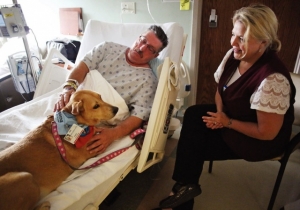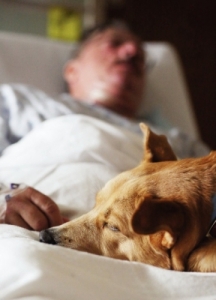Treatment companion
By Brandon Davis
Published in News on September 26, 2016 9:57 AM

News-Argus/CASEY MOZINGO
Wendy, a therapy dog, visits with Jeff Hunt in post-op following a neck surgery at Wayne Memorial on Wednesday. The hospital's staff calls it "Wendy Wednesdays." Wendy and Shilah take turns providing therapy at the hospital with volunteer therapy dog handler Colleen Coleman, pictured at right.

News-Argus/CASEY MOZINGO
Wendy rests her head on the lap of Hunt in post-op following his neck surgery at Wayne Memorial Hospital on Wednesday. Hunt was expecting to return to his home in Jacksonville later that afternoon, but welcomed a visit from the therapy dog.
Pain and sickness seemed to leave a patient's room for a moment -- whenever Wendy and Shilah walked in.
Wendy, a 6-year-old German shepherd labrador mix, and Shilah, a 5-year-old yellow labrador, visited patients at Wayne Memorial Hospital Wednesday for the hospital's successful dog therapy program.
Colleen Coleman, the dogs' handler, said one dog is allowed in a room at a time, but this rule didn't sit well with Wendy as she watched Shilah walk away with Ms. Coleman to see patients on the fourth floor.
Wendy whimpered, but Shilah continued walking.
Ms. Coleman first took Shilah in a large room to visit patients who were receiving chemotherapy. Shilah propped her chin on the knees or laps of patients, and soon the patients showered Shilah with hands petting her and scratching her neck.
"It's a distraction. It's like a baby coming in here," Ometha Hooker said, who arrived on the oncology floor last Tuesday.
"You remember those other things than just the pain."
Mrs. Hooker placed a peanut butter cracker on Shilah's paw, and Shilah waited patiently until Ms. Coleman told her she could eat it. Mrs. Hooker said her boxer at home would have given into temptation and eaten the cracker.
She said dogs may not obey orders at all times, but they are natural protectors and they sense pain.
"They know when you are sick," Mrs. Hooker said. "It doesn't matter to them if you are sick. They need you, you need them."
Shilah left Mrs. Hooker's room and was bombarded with smiles and neck scratches from nurses as she walked toward the elevator. Shilah reunited with Wendy on the first floor, but Wendy walked proudly with Ms. Coleman to see patients on the second floor.
Wendy, however, didn't want to do tricks with crackers or prop her head on a lap. She had different plans for her patient.
Jeff Hunt arrived at the hospital for neck surgery on Tuesday. Hunt's neck was bandaged and he was in pain, but he didn't mind Wendy lying on the bed with him.
Ms. Coleman picked up Wendy's front legs, set them on the bed and then picked up her back legs to do the same.
"She usually just jumps right up, but she's careful," Ms. Coleman said. "She wants to be careful."
Wendy positioned herself on Hunt's legs, and he scratched Wendy's forehead.
"All the dogs, they know when you're sick or don't feel good. They know when you get nervous," Hunt said, who trains his English springer spaniel at home to be a service dog. "They're constant companions. They'll follow you around everywhere."
"Someone who's going to be here for a long time, this is nice, especially if you don't have anyone else. My wife spent all night here, but if you didn't have your family members with you, this is like family right here," he said as Wendy continued lying on his bed.
Hunt crossed his fingers for good luck in his recovery, and Wendy crossed her paws.
After 13 minutes in Hunt's room, Ms. Coleman picked up Wendy and walked her back to the first floor.
Ms. Coleman said a therapy dog is required to visit a patient for two to three minutes, according to Wayne Memorial, but she said sometimes a patient needs the company for a longer period of time.
"When you see someone embracing that moment, and they need it, you can't push that forward and say, 'OK, that's enough,'" Ms. Coleman said. "I do give patients all that they need to a point where I need to move forward.
"(But) when they get on the bed, it's a beautiful thing."
Donna Archer, director of volunteer services at the hospital, said the time requirement was implemented because people were uneasy, at first, about dogs being in a hospital. She said it is understood now that dog therapy is important for the patient's need for companionship and comfort.
Shilah now goes to patient's room on Mondays, and Wendy visits patients on, well -- Wendy Wednesdays -- and they both see 15 patients in one day.
"I've always had dogs, so I knew the power of dogs, the healing power of dogs," Mrs. Archer said. "And talking to other hospitals, I knew they were already doing it, and we needed it.
"People are in the hospital for longer now, they're sicker now than they used to be. And if they're going to be here, we need something, a diversionary tactic, something to take their mind off of their pain. And that's what it does."
Ms. Archer brought up the idea to the hospital board in October, and the dog therapy program took off in May. She said handlers must be certified through Therapy Dogs International or Pet Partners. She said only licensed therapy dogs can visit patients at the hospital, and therapy dogs must pass 13 tests, such as loose-leash walking, sit commands, walking through doorways and more.
Ms. Coleman said Wendy is a foster dog from Wilson, and Shilah came from a litter of puppies in Nashville. She said she has trained them for three years, and she said Wendy and Shilah passed all 13 tests.
Only licensed therapy dogs can visit patients at the hospital, she said.
"I enjoy being with patients in a time of need. If I can brighten their day with my dogs, I've done a great work," Ms. Coleman said. "Dogs are there for people, they're compassionate and loving, and they're always ready to serve."
